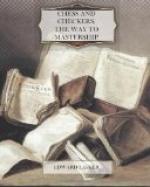The present ranking of the professional Chess masters is about the following:
1. Emanuel Lasker, Berlin, World’s Champion. 2. J. R. Capablanca, Havana, Pan-American Champion. 3. A. Rubinstein, Warsaw, Russian Champion. 4. K. Schlechter, Vienna, Austrian Champion. 5. Frank Marshall, New York, United States Champion. 6. R. Teichmann, Berlin. 7. A. Aljechin, Moscow.
Other players of international fame are the Germans, Tarrasch and Spielmann, the Austrians, Duras, Marocy and Vidmar, the Russians, Bernstein and Niemzowitsch, the Frenchman, Janowski and the Englishman, Burn. Up to the time of the outbreak of the war the leading Chess Clubs of the different countries arranged, as an annual feature, national and international tournaments, thus bringing the Chess players of all nationalities into close contact.
This internationalism of Chess is of great advantage to the Chess player who happens to be traveling in a foreign country. There are innumerable Chess Clubs spread all over the globe and the knowledge of the game is the only introduction a man needs to be hospitably received and to form desirable social and business connections.
It would be going beyond the limit of this summary of the history of Chess if I tried to give even an outline of the extremely interesting part Chess has played in French, English and German literature from the Middle Ages up to the present time. Suffice it to mention that Chess literature by far exceeds that of all other games combined. More than five thousand volumes on Chess have been written, and weekly or monthly magazines solely devoted to Chess are published in all countries, so that Chess has, so to speak, become an international, universal language.
The History of Checkers
The literature on the game of Checkers (English: Draughts) is very limited and there are no certain references to prove that the game was known before the Sixteenth Century. Two theories are current as to its origin; one of them claiming it to be a simplified Chess, the other explaining it as the result of transferring the Spanish game Alquerque de doze to the Chess board.
H. J. R. Murray, the greatest authority on the history of games, considers it most likely that the game has been evolved from both Chess and Alquerque. The method of capturing men and the rule concerning the huffing of a man unquestionably point to the Spanish game, while the board, the diagonal move of the men and the idea of crowning a man are taken from Chess.
In France, Germany, Italy and Spain the name of the game is still that of the Queen of Chess (Dame, Dama) whose move in the Middle Ages was identical with the move of the Checkermen.
Checkers has never been able to attain more than national uniformity, and it is played with different rules in different countries. In the United States it is more popular than in any other country and a number of players have obtained national fame. The best players at present are considered to be Newell Banks and Alfred Jordan.




